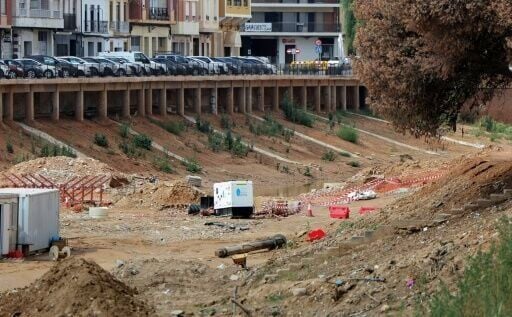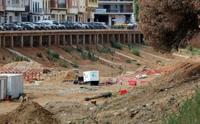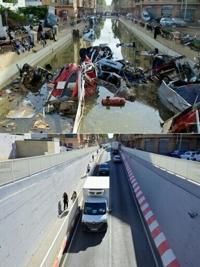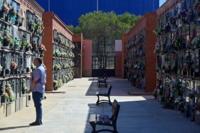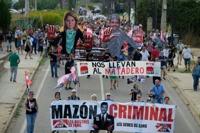When the first autumn rains fell this year, Toni Garcia drew the curtains.
Rain is a painful reminder of last year's devastating floods that killed more than 200 people in Spain, including her husband and only daughter.
"Everything comes back to me. From being with my family to being alone," Garcia said through tears at her home in Benetusser, on the southern outskirts of the Mediterranean port city of Valencia.
"On October 29, 2024, many families, including mine, perished."
It did not rain in Benetusser that grey Tuesday, but a "tsunami of reeds and water" triggered by torrential downpours kilometres away surged into her street.
Garcia watched from the balcony as the flood approached.
Her husband, Miguel, 63, and daughter, Sara, 24, a nurse, had gone to the basement garage to move their cars in case the rain predicted by the media arrived.
Both were among the 237 people killed, mostly in the province of Valencia, in Spain's worst natural disaster in a generation.
"They were my whole life. I will fight for them because they died unjustly," Garcia said, criticising the regional government for failing to alert residents in time.
- 'So people remember' -
The floods hit 78 municipalities, sweeping away 130,000 vehicles and damaging thousands of homes, and generating 800,000 tonnes of debris, mainly around Valencia, Spain's third-largest city.
"We were left with only what we were wearing," recalled Pedro Allegue, an 81-year-old retiree in Paiporta, one of the hardest-hit towns, where 45 people died.
His voice echoed through the empty rooms of the ground-floor home he and his wife had escaped via a courtyard stairwell. Part of the house remains in ruins.
The thick mud that covered the town has given way to the roar of machinery as homes are rebuilt.
The floods affected more than 8,000 businesses, some of which are still struggling to reopen, according to the Valencian business confederation Confecomerc.
"I lost six months of my life, but I've reopened," said David Parra, 51, at his trophy shop in Paiporta, which he escaped on the day of the floods by breaking through the bathroom ceiling.
He has placed the books and shovels used by volunteers and family members to remove mud in his storefront display.
"It's so people remember," he said, holding a small tile reading: "The flood reached this point. Only the people save the people."
- 'Hard to move on' -
Thousands of volunteers helped residents in the days after the floods, when locals felt abandoned by the authorities. Tensions erupted into protests during a visit by the Spanish royal family to Paiporta.
About three kilometres (two miles) away in Alfafar, noisy machines now tear down the remains of the Orba school.
The floods disrupted classes for more than 48,000 pupils and damaged 115 schools. Eight schools, including Orba, must be rebuilt, and students began the new year in prefabricated classrooms.
"Many children freeze or become anxious at the first sign of rain," said Ana Torres, 47, as she escorted her two children to temporary classrooms.
She returned to her water-damaged home a month ago but said much remains to be rebuilt.
"Not being able to live life as before makes it hard to move on," she said.
- Protests -
In Catarroja, where 25 people died, a wall bears the message: "20:11. Neither forget nor forgive", marking the time flood warnings reached residents' mobile phones. By then, it was too late.
"When I managed to speak to my father at 7:50 pm, he was drowning," said Rosa Alvarez, 51, at the house in Catarroja where her 80-year-old father died after floodwaters knocked down one of its walls.
Alvarez, who heads an association representing victims of the floods, is fighting in court for accountability over what they consider negligence by the authorities. She said she feels her father was "killed" by their inaction.
Campaigners have taken to the streets every month, demanding the resignation of the head of the regional government Carlos Mazon over his handling of the disaster, with the next demonstration scheduled for Saturday.
Regional authorities insist they did not have the information needed to warn people sooner.
"This isn't just a personal wound, it's a wound we all share," said Alvarez. "We have to make sure something like this never happens again."
rs/ds/cc



